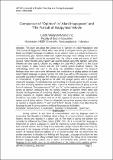Comparison of 'Opinion' in 'Alani Hapogoson' and 'The Pursuit Happynes' Movie
Abstract
Abstract: This study was about the Comparison of 'Opinion' in 'Alani Hapogoson' and 'The Pursuit of Happyness' Movie which was aimed to compare how to give Opinion in Batak and English language. In addition, to see whether there is a cultural influence in communicating give Opinion Batak and English language since talking about how to communicate really cannot be separated from the culture, rules and norms of each speaker. Some theories about speech are used to discuss about the opinion, and some theories are also used to classify and analyze the data which concerns to the Social Level System of Batak Society and the The Kinship System (Dalihan Natolu). The methodology which was used in this study was qualitative research. The research findings show there were some differences and similarities of giving opinion in Batak anad English language. In giving opinion, the older gave with a soft language, nurturing and polite and greatly maintain the feelings of younger people (who became his partner in conversation). In giving opinion to the elder, the younger person uses a polite and respectful language. Acknowledgments and thanking are always spoken by the younger ones after receiving opinions from the elder. In general sentence form of giving is in the form of statement. The expressions of "ah" and "eh" at the beginning of the speech act of giving an opinion, indicating that the opinion contains an opinion which states and denotes the disagreement of something related to what the previous speaker has said. In giving opinions in English, delivered directly, not long-winded, not complicated, sometimes less polite and short. And all of this appears in almost every condition of speech acts of giving opinion. There is a linguistic marker that appears when conveying an opinion in English which is "I said" and "I think". Beside, Culture does affect how the language is used in giving opinions in Batak language and in English.

